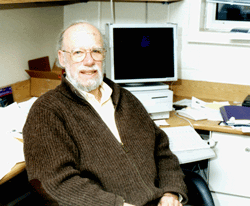
Professor, Department of Cell Biology
Chanin Bldg., Room 403
718.430.3527
matthew.scharff@einsteinmed.org
Research Interest
Recent Publications
Biosketch
|
|
Our laboratory is studying how antibody-forming cells respond to antigen by undergoing somatic hypermutation and class switch recombination so that they can produce higher affinity antibodies with more useful effector functions. The molecular and biochemical mechanisms of antibody variable region hypermutation and class switch recombination is being studied in mice that have mutations in various repair proteins in collaboration with Dr. Winfried Edelmann. In order to examine detailed molecular mechanisms, we are also studying how mutation is targeted to antibody genes and some oncogenes in human Burkitt’s lymphoma cell lines which are undergoing variable region mutation in culture. These cell lines and genetically defective mice are being used to study the role of activation induced deaminase (AID), mismatch repair and error prone polymerases in the variable region hypermutation and isotype switching. The analysis of these events also involves the examination of AID activity biochemically and, in collaboration with Drs, Aviv Bergman and Thomas MacCarthy, computationally to analyze and simulate the details of the mutational activity that leads to the generation of antibody diversity.
The highly mutagenic processes required to generate antibody diversity also leads to B cell lymphomas so we are trying to understand how AID causes mouse B cell lymphomas and human Chornic Lymphocytic Leukemia (in collaboration with Dr. Nicholas Choirazzi) and how mismatch repair protects B cells from undergoing malignant transformation while also contributing to the generation of antibody diversity.
We are also using somatic mutation and isotype switching to generate better monoclonal antibodies that will protect the host from lethal toxins and emerging infections. Monoclonal antibodies to such toxins and viruses are generated and the impact of affinity and isotype are determined in vitro and in vivo.
|